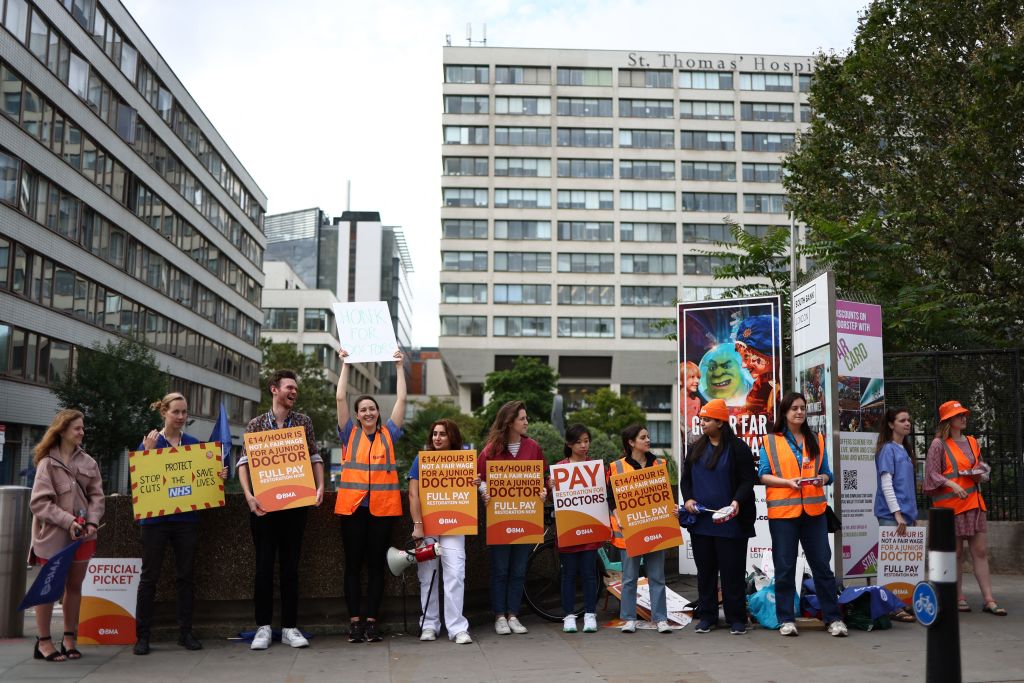Doctors haven’t always been keen on the NHS. A former chairman of the British Medical Association (BMA) said in response to the 1946 National Health Service Act, that: ‘It looks to me uncommonly like the first step, and a big one, to National Socialism as practised in Germany.’ In 1948, the BMA claimed that only 4,734 doctors, just over 10 per cent of those polled, were in favour of such a system.
At one point, the Minister for Health and father of the NHS Aneurin Bevan described the BMA as a ‘small body of politically poisoned people’ who had decided to ‘fight the Act… and to stir up as much emotion as they can in the profession’. Among his adversaries was the secretary of the BMA, Charles Hill, who argued healthcare should be paid for by insurance, not taxation.
What a curious perversion this is of the current status quo. Now, it is Conservative politicians who are unequivocal in their praise of the NHS. While shadow health secretary Wes Streeting has accused the union of being ‘hostile’ towards vitally needed NHS reform efforts, the BMA’s relations with Labour are infinitely more cordial than with the government.
And the latest round of junior doctor strikes are being conducted, in the words of the BMA, to ‘save’ the NHS. Professor Philip Banfield, chair of the union’s council, insists the walkouts were called to protect the long-term future of a service which, he believes, cannot keep losing doctors.
It’s a familiar refrain: the union, which helps bring the healthcare service to its knees with strike action, is seeking to protect it. While the Tories, who during their time in power have presided over increases in NHS funding every year, ‘undervalue’ it. It is patently nonsense.
Back in 1948, under pressure from the BMA, Bevan boasted he would ‘stuff the doctors’ mouths with gold’ – agreeing they could continue to see patients privately provided they would take on NHS ones. The union approached the government to negotiate a wage increase, starting with demands of a 35 per cent pay uplift. This seems increasingly outlandish when the inflation rate has fallen below 4 per cent, and given nurses accepted an offer of 5 per cent with a one-off payment of £1,655.
Junior doctors in England have received a 2 per cent pay rise in 2022/23, as part of a multi-year pay deal agreed in 2019, with new health secretary Victoria Atkins offering a further 3 per cent rise from January. Although the BMA accepted a similar deal from the Scottish government, it appears to view Westminster’s offer as derisory. Junior doctors in England took to the picket lines at 7am on Wednesday for three days, meaning staffing levels will not return to normal until 27 December due to the weekend and bank holidays. There will be a six-day walkout in January.
Patients who would otherwise have gone home for Christmas have not been able to be discharged during the latest round of strike action. Some have described these strikes as their ‘worst fears realised’, and no wonder: the NHS has cancelled an average of 35,500 appointments during each of the 25 days of industrial action taken by junior doctors earlier this year. The NHS waiting list has topped 7.7 million; these walkouts could tip the number over eight million. Charities have warned that it is the elderly who bear the brunt, with postponed surgeries such as hip operations leaving them in ongoing pain.
The BMA may maintain that they strike with the public behind them, but the more misery the walkouts inflict, the more people may question the morality of generously-remunerated professionals refusing to work during the busiest time of the year. NHS pensions are now so generous that a handful of retired doctors are being paid a higher income than the Prime Minister. The BMA isn’t just an association, but a militant union which has previously thwarted government efforts to lift the student medical places cap. It is a union that is willing to negotiate with the SNP-led Scottish government yet seems more reluctant to get round the table in Westminster.
The most recent British Social Attitudes Survey found that, between 2021 and 2022, overall satisfaction with the NHS fell 7 percentage points to just 29 per cent, with long waiting times for GP and hospital appointments largely to blame. Meanwhile, record numbers of people are taking out private health insurance because they simply cannot access the service their taxes pay for. Streeting has talked of ‘reform’, however modest it may turn out to be. The NHS is losing its shine: what a strange irony it would be if the BMA destroyed it for good.






Comments